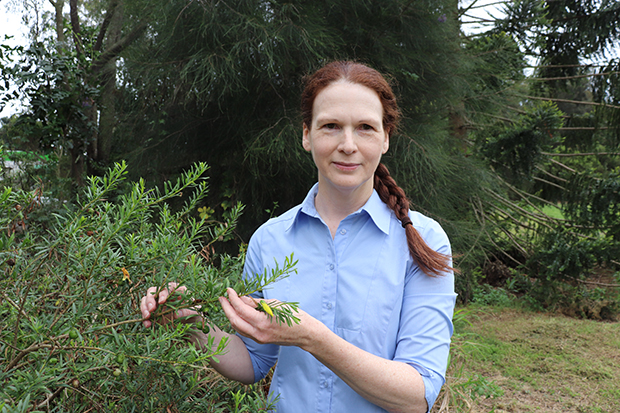A University of Queensland project to mass-produce a more genetically diverse and resilient species of the native Australian emu bush will boost vital land restoration and revegetation efforts across the country.
The ARK Linkage project led by UQ’s from the , aims to improve seed germination of the hardy shrub, important to the ecosystem.
“Emu bush, or Eremophila, is the fifth largest genus of Australian native plant, providing habitat, nectar and fruit for insects and birds while stabilising soils,” Dr Cave said.
“Until now, it’s received little research attention so there is a gap in our understanding of how it will respond to changes in climate and how it can be used for land restoration.”
Researchers are using a combination of molecular biology, DNA sequencing and proteomics to gain insights into the mechanisms that control seed germination in Eremophila.

“Any large restoration projects have so far had to propagate the plant from cuttings, but our research will change that,” Dr Cave said.
“Our aim is to enable land restoration groups and commercial nurseries to grow a range of Eremophila species from seed, meaning greatly improved biodiversity at planting sites with seedlings adaptable to a range of growing conditions.
“Specifically, we are developing enhanced coatings for seeds and pre-treatments, either chemical or mechanical, which will improve germination and promote the growth of healthy seedlings.”
Researchers say a change from using cuttings to seed-propagated plants will facilitate natural adaptations in the plant to a warmer, drier climate.
“Revegetation of degraded lands and mine sites using a wide range of native herbs, shrubs and trees is important to encourage self-sustainable ecological systems,” Dr Cave said.
“Most species of emu bush are endemic to arid inland regions, where increased temperatures and water stress are placing significant strain on native plants.
“These stressors have been found to stop seed germination in six arid zone native grasses and there are more than 200 species of Eremophila which could share the same fate.
“It is our job to figure out ways to improve seed germination in as many of those species as possible and in the process, change the outcome of restoration projects in Australia.”
Image above left: Dr Robyn Cave from UQ’s School of Agriculture and Food Sciences.








